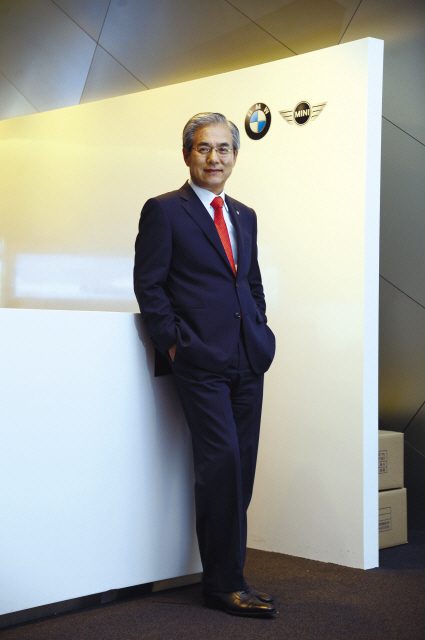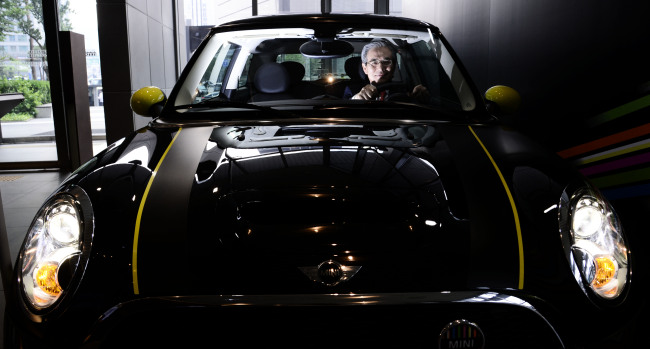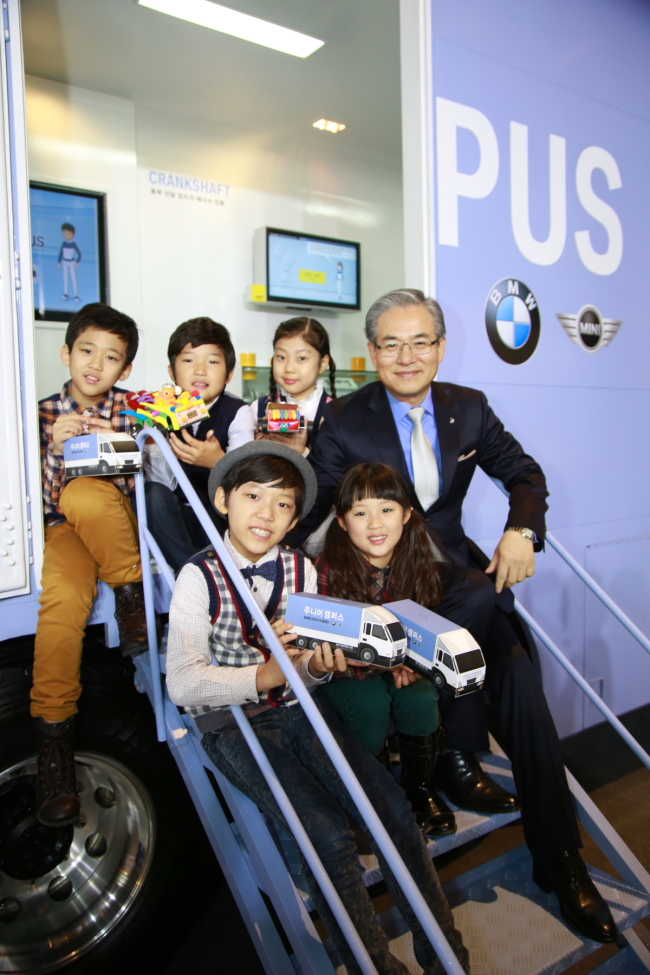The man driving BMW’s success in Korea
BMW Korea chief Kim Hyo-joon dedicated to increasing benefits of owning a BMW
By Korea HeraldPublished : June 28, 2013 - 20:42
For BMW, competition is everywhere.
But having been the best-selling premium car brand here for the past 13 years, BMW Korea, led by CEO Kim Hyo-joon, now takes a more relaxed approach.
“We no longer do things to catch up with others. Instead, we stay focused on delivering our best brand value to customers,” Kim said in an interview with The Korea Herald.
Kim, 56, is something of an icon of the stellar growth of the nation’s import car market.
But having been the best-selling premium car brand here for the past 13 years, BMW Korea, led by CEO Kim Hyo-joon, now takes a more relaxed approach.
“We no longer do things to catch up with others. Instead, we stay focused on delivering our best brand value to customers,” Kim said in an interview with The Korea Herald.
Kim, 56, is something of an icon of the stellar growth of the nation’s import car market.

In 1995, when the former regional head of the drugmaker Syntec joined BMW, foreign carmakers had a tiny 0.02 percent market share. The No. 1 brand was Mercedes-Benz, while BMW was almost invisible.
“Among other things, I wanted to renew people’s awareness of foreign cars at the time,” he said, recalling the years when foreign car owners used to become targets of tax investigations.
So Kim, then chief financial officer, knocked the door of the Foreign Affairs Ministry to make an unprecedented proposal ― making BMW the official car during the Asia-Europe Meeting in Korea in 2000.
After months of persuasion, the Korean unit provided 150 7 Series limousines for the event to carry top diplomats from around the world who, he said, were surprised to see Korea’s “openness.”
The vehicles also impressed Korean customers. The Korean unit sold the cars at bargain prices and all 150 vehicles were sold within five days. At the time, BMW Korea had monthly sales of just 50 units.

Since then, BMW has offered its high-end models for official use during international events such as the Asia-Pacific Economic Cooperation meeting, the G20 summit and the Nuclear Security Summit in recent years.
BMW’s presence grew slowly but surely.
But even after Kim took the helm of BMW Korea in 2000, his management skills were tested numerous times.
“Dealership owners advised me at the time: ‘BMW is the No. 2 brand. There is not much we can do but to sell our cars at cheaper prices than Mercedes,’” he said.
He immediately headed to Germany’s autobahn to test-drive the BMW and all its rival brand cars. After doing so, he said, “BMW was the best car for me.”
Equipped with confidence in product quality, Kim pushed ahead relentlessly to improve brand awareness and service quality overall. Finally in 2008, BMW outpaced Mercedes in terms of sales.
Under his leadership, BMW’s annual sales surged from 5,438 in 2003 to 34,079 last year. Now 1 in 4 foreign brand cars here is a BMW.
“BMW is defined as dynamic, challenging and modern ― the very characteristics of Korean people. Despite difficulties in the past, Koreans have sought something new and innovative,” he said.
“That’s why, I believe, many Korean customers consider BMW as a brand that best represents what they have achieved.”
He also pointed out that improved service quality has also boosted car sales. BMW currently hires about 1,200 technicians at its service centers across the nation, with 43 of them being “master” qualified by the government.

Amid BMW’s stunning growth, the nation’s import car market has also soared to claim 10 percent of the total market share.
Kim believes that efforts to elevate sales figures is not enough to maintain the No. 1 status in the heated market. So he has come up with diverse ideas to add value to owning a BMW in Korea.
One such ambitious idea was having a BMW track here.
“The head office at first was skeptical about the idea. But I persuaded them every time I visited Germany,” Kim said.
“I assured them that we would attract more customers delivering an image as a company that leads the nation’s driving culture. The Korean Wave also affected the decision positively.”
Early this month, the first BMW driving center outside Germany and the United States where the carmaker builds cars broke ground to start construction on Yeongjongdo Island, Incheon.
The Korean unit has already gained attention from other BMW markets for its diverse and creative activities that aim not just at increasing car sales but also at delivering social values that correspond to BMW’s corporate philosophy.
The Future Foundation is a charitable arm of BMW, the first of its kind within the import car industry. They ask customers to donate money when they buy a car. When the buyer donates, BMW Korea matches the amount.
The Korean team also operates an unprecedented ombudsman program for a premium brand last year that allows customers to file their service complaints online. They plan to publish the program’s one-year analysis report in October.
Kim also has keen interest in introducing competitive suppliers to work with BMW. About 100 Korean companies already supply auto parts to the carmaker, with their transaction volume reaching 4 trillion won ($3.5 billion).
“A leader is a person who sees what others can’t and exerts unlimited imagination to create something from it. But you need to know it is a time-consuming process,” he said.
Earning recognition for such distinctive activities, Kim in May was promoted to senior vice president at BMW Group. Of some 350 BMW senior executives globally, only 50 are appointed as senior vice president.
As one of the longest-serving CEO within the industry, the BMW head sees no deadline for his tenure.
“Many leaders see the first two to three years but we need to see the next 10 years,” he said. “Even after my retirement, if my predecessors continue the projects that I carried out, that’s also very rewarding for me.”
Having pushed hard with new projects in recent years, the CEO pledged to make this year one of consolidation.
By Lee Ji-yoon (jylee@heraldcorp.com)
-
Articles by Korea Herald









![[KH Explains] Naver’s Line dilemma: Lose global footing for cash?](http://res.heraldm.com/phpwas/restmb_idxmake.php?idx=644&simg=/content/image/2024/05/14/20240514050624_0.jpg&u=)

![[Herald Interview] Carbon breakthrough in Korea: Making diamonds at atmospheric pressure](http://res.heraldm.com/phpwas/restmb_idxmake.php?idx=644&simg=/content/image/2024/05/14/20240514050559_0.jpg&u=20240514184059)







